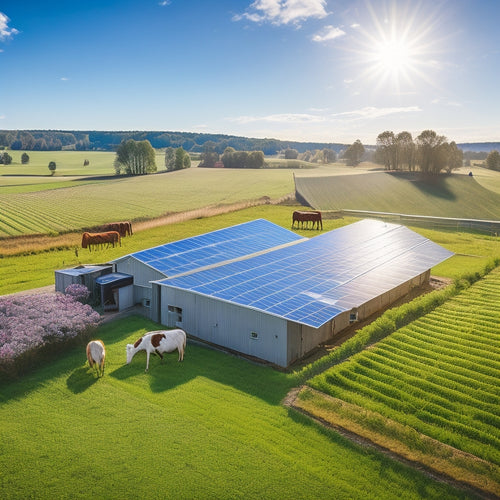
Energy Efficient Technologies Reduce Your Carbon Footprint
Share
Energy-efficient technologies considerably reduce your carbon footprint while lowering your utility bills. By investing in smart thermostats, LED lighting, and energy-efficient appliances, you optimize energy use and enhance your home's comfort. These technologies not only cut energy costs but also contribute to a cleaner environment by minimizing greenhouse gas emissions. For example, solar panels generate electricity without harmful emissions, promoting energy independence. Additionally, understanding and selecting appliances based on energy ratings guarantees you make informed choices that benefit both your wallet and the planet. Investigate how these advancements can positively impact your lifestyle and create a sustainable future.
At a Glance
- Energy-efficient technologies, such as smart thermostats and LED lighting, significantly lower energy consumption and reduce carbon emissions.
- Renewable energy sources like solar panels and wind turbines generate clean electricity, minimizing reliance on fossil fuels and decreasing carbon footprints.
- Energy-efficient appliances, indicated by high energy ratings, lead to lower utility bills and reduced greenhouse gas emissions over time.
- Improved indoor air quality and thermal comfort from energy-efficient HVAC systems contribute to healthier living environments and reduced pollution.
- Government incentives for energy-efficient upgrades promote adoption, helping individuals and communities lessen their carbon impact while saving money.
Lower Utility Bills Guaranteed
By implementing smart thermostats, you can optimize your heating and cooling schedules, which directly reduces your energy consumption.
Additionally, integrating energy storage solutions can further enhance efficiency by using stored energy during peak demand times.
Switching to LED lighting can result in significant savings, as they use up to 75% less energy compared to traditional bulbs.
Together, these technologies not only enhance comfort but also guarantee lower utility bills over time.
Smart Thermostats Efficiency
Many homeowners are finding that smart thermostats can greatly enhance energy efficiency and lower utility bills. These devices offer features like smart scheduling, allowing you to set your heating and cooling preferences based on your daily routine. With temperature control and energy monitoring, you can track your usage and adjust settings accordingly to save money.
Here's a quick overview of the benefits:
| Feature | Benefits |
|---|---|
| Smart Scheduling | Automates temperature based on your routine |
| Remote Access | Control your thermostat from anywhere |
| Adaptive Learning | Learns your habits for ideal settings |
User customization is another significant aspect, enabling you to tailor your thermostat to fit your lifestyle. With eco-friendly features, you contribute to a greener planet while saving money. Installation tips are essential, too; many smart thermostats are easy to install with minimal tools.
LED Lighting Benefits
Switching to LED lighting is one of the most effective ways to cut down on energy costs while enhancing your home's efficiency.
LEDs typically offer a lifespan of 25,000 hours or more, greatly outlasting traditional bulbs. This longevity translates to fewer replacements, reducing waste and lowering your overall environmental impact.
The energy conversion efficiency of LEDs is extraordinary; they convert about 80% of energy into light, minimizing heat emission compared to incandescent options. This efficiency allows you to enjoy superior light quality without excessive energy use.
With various color temperatures available, you can create the perfect ambiance for any room, enhancing your home's design versatility.
Many LED options also come with dimming capabilities, giving you control over brightness and further reducing energy consumption when full light isn't necessary.
Although the initial investment might be higher, the long-term savings on utility bills make it a smart financial choice.
Additionally, the application variety of LEDs means they can fit into any fixture, allowing you to upgrade your entire home seamlessly.
Sustainable Energy Source Advantages
When you consider sustainable energy sources, their benefits extend beyond environmental impact.
They often lead to considerable cost savings, as renewable technologies like solar and wind have seen decreasing installation costs and increased efficiency.
Additionally, financial incentives greatly reduce installation costs, making solar power an attractive option for homeowners.
Renewable Energy Benefits
Renewable energy sources, such as solar, wind, and hydropower, offer significant advantages that can change our approach to energy consumption. By utilizing these sustainable technologies, you can reduce your reliance on fossil fuels and contribute to a cleaner environment.
One of the foremost solar panel advantages is their ability to generate electricity without emitting harmful greenhouse gases. As you install solar panels, you're not just decreasing your carbon footprint; you're also equipping yourself with energy independence.
Wind energy benefits extend beyond environmental impact. Wind turbines convert kinetic energy into power efficiently, often requiring less land than traditional energy sources. This means you can support energy production while preserving natural surroundings.
Additionally, renewable energy sources often lead to job creation in emerging green technologies, allowing communities to flourish economically.
Cost Savings Potential
Utilizing sustainable energy sources can lead to substantial cost savings for both individuals and communities. The investment returns on technologies like solar panels and wind turbines are increasingly favorable due to rapid technology advancements. These innovations not only lower installation costs but also improve efficiency, allowing you to generate more energy at a lower price.
Moreover, the environmental impact of adopting these sources is significant. By reducing reliance on fossil fuels, you contribute to cleaner air and a healthier planet, which can translate into lower healthcare costs over time.
Don't forget about government incentives; many regions offer tax credits and rebates for renewable energy installations, making your initial investment even more appealing.
Increased consumer awareness is also driving down costs. As more people adopt sustainable technologies, economies of scale come into play, resulting in lower prices for everyone.
Key Benefits of Energy Efficiency
When you implement energy-efficient technologies, you can considerably lower your utility bills, providing immediate financial relief.
Additionally, these solutions often enhance comfort levels in your home by maintaining consistent temperatures and improving air quality.
By embracing energy independence and autonomy through solar power systems, you not only reduce your carbon footprint but also protect yourself from unpredictable electricity rate hikes.
Understanding these benefits can motivate you to make informed decisions about energy consumption.
Lower Utility Bills
Energy efficiency is a potent way to greatly lower your utility bills while also contributing to environmental sustainability. By implementing energy-efficient technologies, you can considerably reduce your energy consumption, translating into direct savings on your monthly bills.
Conducting energy audits is a critical first step. These assessments help identify areas where your home or business loses energy, allowing you to prioritize improvements. For instance, sealing leaks or upgrading insulation can yield immediate cost savings.
In addition, many utility companies offer utility incentives to encourage these upgrades, further reducing your expenses. They may provide rebates for purchasing energy-efficient appliances or even financing options for larger projects.
Incorporating smart technology, such as programmable thermostats, also enhances efficiency by optimizing energy use based on your schedule. Studies indicate that households adopting these technologies can save up to 30% on heating and cooling costs.
Ultimately, investing in energy efficiency not only decreases your utility bills but enables you to take control of your energy expenses. By making informed choices and leveraging available resources, you can enjoy financial freedom while positively impacting the environment.
Enhanced Comfort Levels
Investing in energy-efficient technologies not only leads to lower utility bills but also greatly improves comfort levels in your home or workplace. One of the primary benefits of these technologies is enhanced thermal comfort. Energy-efficient insulation, for instance, helps maintain stable temperatures, reducing drafts and preventing heat loss during winter months. This stability allows you to enjoy your environment without constantly adjusting your thermostat.
Moreover, energy-efficient systems often contribute to superior indoor air quality. Advanced HVAC systems equipped with better filtration can markedly reduce indoor pollutants, allergens, and humidity levels. This improvement is vital for maintaining a healthy living or working space, allowing you to breathe easier and feel more energetic.
Studies show that environments prioritizing thermal comfort and indoor air quality lead to higher productivity and overall satisfaction. By creating spaces that nurture both physical comfort and emotional well-being, you enable yourself to thrive.
Ultimately, embracing energy-efficient technologies not only benefits your wallet but enhances your everyday life, giving you the freedom to enjoy your surroundings without compromise.
Make the shift today, and experience the difference firsthand.
Selecting Based on Energy Ratings
When you're selecting energy-efficient products, understanding energy ratings is essential.
These ratings provide a standardized way to compare product efficiencies, allowing you to make informed decisions. By analyzing these ratings, you can identify which options truly offer the best energy savings for your needs.
Additionally, opting for energy-efficient appliances not only reduces your carbon footprint but also contributes to significant cost savings over time, especially when powered by solar energy.
Understanding Energy Ratings
Understanding energy ratings can greatly influence your choice of appliances and systems, as these ratings provide essential insights into their efficiency and performance. When you look at energy labels, you're not just seeing numbers; you're interpreting the energy label importance that reflects how much energy an appliance uses in comparison to others. This information is vital for making informed decisions that align with your values and lifestyle.
Consumer awareness plays an essential part in this process. By being knowledgeable about energy ratings, you can assess which appliances will minimize your carbon footprint, thereby contributing to both cost savings and environmental sustainability.
For example, energy-efficient refrigerators use considerably less electricity than older models, which can lead to lower utility bills and less demand on power grids.
Moreover, understanding these ratings enables you to advocate for greener technologies. By choosing high-rated appliances, you're not just making a purchase; you're participating in a larger movement towards energy efficiency.
Comparing Product Efficiencies
Selecting appliances based on energy ratings requires careful comparison to identify the most efficient options available. When you're looking at product comparisons, it's essential to focus on efficiency metrics like the Energy Star rating, which indicates an appliance meets strict efficiency guidelines set by the U.S. Environmental Protection Agency.
These ratings can help you understand how much energy an appliance consumes compared to similar models. Take the time to compare energy consumption across different products. For instance, a refrigerator with an Energy Star rating uses about 15% less energy than a standard model, greatly reducing your electricity bill and your carbon footprint.
Similarly, when selecting a washing machine, look for models that offer high efficiency ratings, as they typically use less water and energy per load. Don't forget to check annual operating costs, as these numbers provide information into long-term savings.
Investing in energy-efficient appliances not only promotes a sustainable lifestyle but also enhances your personal freedom by lowering utility bills and minimizing environmental impact. By prioritizing product comparisons based on energy ratings, you're making informed choices that benefit both your wallet and the planet.
Long-term Cost Savings
When you invest in energy-efficient technologies, you can expect to see a significant reduction in your utility bills over time.
Studies show that appliances and systems with higher efficiency ratings consume less energy, leading to lower monthly costs.
Lower Utility Bills
How much could you save on your utility bills by embracing energy-efficient technologies? The answer lies in understanding the impact of energy audits and appliance upgrades.
Conducting an energy audit can reveal areas where your home wastes energy, often leading to simple fixes that can greatly lower your monthly expenses. For instance, sealing drafts or improving insulation can reduce heating and cooling costs considerably.
Upgrading to energy-efficient appliances is another key strategy. Modern models use less electricity and water, translating to lower utility bills over time. The U.S. Department of Energy estimates that replacing older appliances can save you hundreds of dollars annually.
By investing in these technologies, you're not just saving money; you're also gaining the freedom to allocate resources elsewhere, enhancing your financial independence.
Moreover, many utility companies offer rebates for these upgrades, providing immediate cost savings.
In the long run, integrating energy-efficient technologies into your home can lead to substantial financial benefits while contributing to a healthier planet.
Frequently Asked Questions
What Is the Carbon Footprint of Common Household Appliances?
Common household appliances contribute greatly to appliance emissions. By opting for eco-friendly alternatives, you can reduce these emissions, leading to a smaller carbon footprint. Analyzing your appliance choices enables you to make more sustainable decisions.
How Can I Measure My Home's Energy Efficiency?
Measuring your home's energy efficiency is like taking your car for a tune-up. Start with energy audits to identify problem areas, then check efficiency ratings on appliances to optimize performance and reduce unnecessary energy costs effectively.
Are Energy-Efficient Technologies More Expensive Upfront?
Yes, energy-efficient technologies often have higher upfront costs. However, they provide significant long-term savings on utility bills, making them a wise investment. You'll enjoy lower expenses and contribute positively to the environment over time.
What Government Incentives Exist for Energy-Efficient Upgrades?
You can take advantage of rebate programs and tax credits for energy-efficient upgrades. Additionally, complying with building codes and undergoing energy audits can further enhance your savings and financial benefits when improving your home's efficiency.
How Do Lifestyle Changes Impact Energy Efficiency?
Lifestyle changes greatly impact energy efficiency. By adopting smart home technologies and altering your behavioral habits, you can optimize energy use, reduce waste, and enhance comfort, ultimately achieving a more sustainable and liberated lifestyle.
Explore More
By embracing energy-efficient technologies, you're not just cutting costs; you're also planting the seeds for a sustainable future. As you reduce your carbon footprint, you enhance both your wallet and the planet. With long-term savings and the advantages of sustainable energy sources, making informed choices based on energy ratings is a smart move. Remember, every small step you take today can lead to a greener tomorrow, proving that efficiency is the key to revealing a brighter, cleaner world.
Related Posts
-

What Do I Need to Know About Farm Solar Panels
When considering farm solar panels, you need to assess costs, benefits, and technical specifics. Initial investment c...
-

Why Outdoor Solar Lighting Systems Are Sustainable
Outdoor solar lighting systems are sustainable because they utilize renewable energy, drastically reducing your carbo...
-

Top Camping Water Bottles for Adventure
When you're out adventuring, picking the right camping water bottle is essential for staying hydrated. Look for durab...


